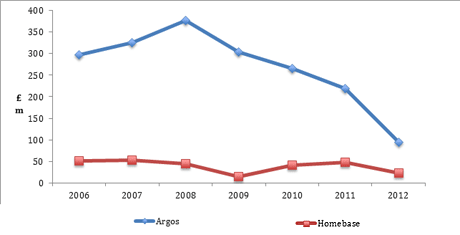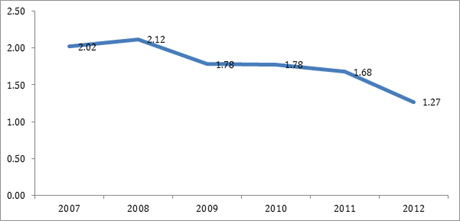Home Retail Group’s results are awful: but is this an opportunity?
After profits collapsed at its Argos and Homebase chains, Home Retail Group's share price has tumbled. But does that mean it's now a buy? Phil Oakley investigates.
Get the latest financial news, insights and expert analysis from our award-winning MoneyWeek team, to help you understand what really matters when it comes to your finances.
You are now subscribed
Your newsletter sign-up was successful
Want to add more newsletters?

Twice daily
MoneyWeek
Get the latest financial news, insights and expert analysis from our award-winning MoneyWeek team, to help you understand what really matters when it comes to your finances.

Four times a week
Look After My Bills
Sign up to our free money-saving newsletter, filled with the latest news and expert advice to help you find the best tips and deals for managing your bills. Start saving today!
Home Retail Group's (LSE:HOME) full year results are shocking.
The profit collapse at both Argos and Homebase clearly shows the pain being felt by many high street retailers. The fact that no final dividend has been declared is a further kick in the teeth for shareholders.
HRG is not in danger of going out of business just yet, but you can certainly understand why its long-term survival might be in question. It's not surprising that the shares have fallen sharply today.
MoneyWeek
Subscribe to MoneyWeek today and get your first six magazine issues absolutely FREE

Sign up to Money Morning
Don't miss the latest investment and personal finances news, market analysis, plus money-saving tips with our free twice-daily newsletter
Don't miss the latest investment and personal finances news, market analysis, plus money-saving tips with our free twice-daily newsletter
In fact, they've fallen so far that there's the possibility of an interesting investment opportunity starting to emerge here.
Let's take a closer look.
What's behind Home Retail Group's woes?
Profit collapse at Argos and Homebase

Profits at Argos have fallen off a cliff. They are down 57% on the back of an 8.9% fall in underlying sales. Most of this is down to a sharp fall in the sales of electronics goods such as TVs. Homebase's sales have only fallen by 2%, but profits have more than halved.
Both these businesses face lots of problems at the same time. Consumers haven't got a lot of money to spend, and when they are spending, they are increasingly doing it online.
But perhaps HRG's biggest problem is that it has to bear the cost of 748 Argos and 341 Homebase stores. The rent on these stores is £363m a year. Total operating costs are £1.9bn. Selling fewer goods means it becomes harder to cover these costs. This is why profits fall much faster than sales do. Its big fixed costs mean that HRG has what is known as very high operational gearing'. This can be deadly in a business with falling sales.
Does Argos have a future? It's difficult to write off a business that still has £3.9bn of sales, but it's going to have to change and fast. To survive, it's going to have to turn itself into an internet retailer.
This is where Argos has some things going for it. It is already the second-largest internet retailer in the UK, with 39% of its total sales made online. It has a growing "click and collect" business where people order goods online and collect from their local store. This is popular with those who want their stuff quickly and is a major competitive advantage over the likes of Amazon. Interestingly, "click & collect" looks set to be a major part of Tesco's online strategy too. But this raises the question of whether Argos can compete with Tesco and Amazon on price.
What about all those stores? Argos needs to cut costs, and one way to do this is to close stores. In many towns, it has more than one store, so closing some should not harm its ability to serve customers too much.
Getting out of rental agreements with landlords can be expensive. However, 230 (30% of all Argos stores) stores have lease renewals or break clauses during the next five years. This could give Argos a welcome opportunity to cut costs.
Homebase needs to slim down too. It also has the opportunity to get out of some leases. And while the business has suffered from a weak housing market, it has been taking market share from its rivals. It is also part of the Nectar loyalty card scheme. The big question regarding Homebase seems to be: at what level do its profits stabilise?
Watch out for hidden debt pile
In recent weeks we have gone on about the hidden debt of UK retailers such as Tesco. This comes from renting rather than owning stores. The future obligation to pay rents is a debt-like liability that does not sit on company balance sheets.
HRG states that it has £194m of net cash on its balance sheet. But dig a little deeper into its results release and it is quite open about having £2.7bn of off-balance sheet debt. Falling profits means that it is becoming more difficult to pay these debts.
Have a look at the chart below. Five years ago, HRG's operating profits covered its rental expenses more than twice. Things are looking a lot less comfortable now. A further sharp fall in profits could see HRG being talked about in the same way as Game Group and HMV where the obligation to pay rents threatens the survival of the whole business.
HRG Fixed Charge Cover

So is HRG a stock for value investors?
Obviously, HRG is in trouble - but the share price is telling us that. Can things get much worse? Could HRG be a cheap stock?
Nothing's certain particularly not for retail chains in this environment. But HRG is now trading for a lot less than its tangible net asset value (NAV) of 116p, which may attract the interest of distressed asset investors.
| Goodwill | 1,543.9 |
| Other intangible assets | 137.1 |
| Property,plant & equipment | 516.3 |
| Inventories | 933.2 |
| Instalment Receivables | 456.7 |
| Other assets | 167.4 |
| Total assets | 3,754.6 |
| Trade & other payables | -1,000.7 |
| Other liabilities | -235.3 |
| Pension liability | -115.3 |
| Tax assets | 24.7 |
| Other | 3.1 |
| Net cash | 194.3 |
| Net asset value | 2,625.4 |
| Less goodwill & intangible assets | -1,681 |
| Tangible NAV | 944.4 |
| Shares | 813.445 |
| Tangible NAV per share(p) | 116.1 |
| Current share price (p) | 86 |
However, it's important to remember that NAVs don't take into account things like redundancy costs or the costs of getting out of rental agreements. So the amount of money you could get if the business was sold off could be a lot less than the books state.
It's very difficult to work out what the level of sustainable profits from HRG is, which is why we see no reason to rush out and buy the shares now.
But if you are an adventurous investor who is prepared to take some risks, then this stock might be worth keeping an eye on.
Get the latest financial news, insights and expert analysis from our award-winning MoneyWeek team, to help you understand what really matters when it comes to your finances.
Phil spent 13 years as an investment analyst for both stockbroking and fund management companies.
-
 Can mining stocks deliver golden gains?
Can mining stocks deliver golden gains?With gold and silver prices having outperformed the stock markets last year, mining stocks can be an effective, if volatile, means of gaining exposure
-
 8 ways the ‘sandwich generation’ can protect wealth
8 ways the ‘sandwich generation’ can protect wealthPeople squeezed between caring for ageing parents and adult children or younger grandchildren – known as the ‘sandwich generation’ – are at risk of neglecting their own financial planning. Here’s how to protect yourself and your loved ones’ wealth.